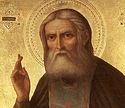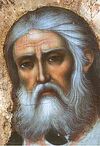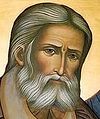

| Previous day | Next day |
| Old Style
July 19
|
Sunday |
New Style
August 1
|
| 6th Sunday after Pentecost. Tone 5. | No fast.
|
![]() St. Macrina, sister of Sts. Basil the Great and Gregory of Nyssa (380).
St. Macrina, sister of Sts. Basil the Great and Gregory of Nyssa (380). ![]() St. Dius, abbot, of Antioch (ca. 430).
St. Dius, abbot, of Antioch (ca. 430). ![]() Uncovering of the relics of St. Seraphim of Sarov (1903). Synaxis of the Saints of Kursk.
Uncovering of the relics of St. Seraphim of Sarov (1903). Synaxis of the Saints of Kursk.
![]() Blessed Romanus, prince of Ryazan (1270). St. Paisius of the Kiev Caves (14th c.). Blessed Stephen Lazarevic, king of Serbia (1427) and his mother St. Milica (Eugenia in schema) (1405). Sts. Demetrius, metropolitan of Rostov (1709), and Mitrophan (1703) and Tikhon (1783), bishops of Voronezh. St. Sophronius, archimandrite, of Svyatogorsk Monastery (1921).
Blessed Romanus, prince of Ryazan (1270). St. Paisius of the Kiev Caves (14th c.). Blessed Stephen Lazarevic, king of Serbia (1427) and his mother St. Milica (Eugenia in schema) (1405). Sts. Demetrius, metropolitan of Rostov (1709), and Mitrophan (1703) and Tikhon (1783), bishops of Voronezh. St. Sophronius, archimandrite, of Svyatogorsk Monastery (1921).
Icon of the Most Holy Theotokos “Umileniye” (“Of Tender Feeling”) of Diveyevo, before which St. Seraphim reposed.
St. Theodore, bishop of Edessa (848). Abba Diocles of the Thebaid.
Repose of Hieroschemamonk Anthony of Valaam (1862), Blessed Abbot Nilus (1870) and Elder John (1903), both of St. Nilus of Sora Monastery, and Archimandrite Nektary (Chernobyl) of Jerusalem (2000).
Thoughts for Each Day of the Year
According to the Daily Church Readings from the Word of God
By St. Theophan the Recluse

Sixth Sunday After Pentacost. [Rom. 12:6-14; Matt. 9:1-8]
The Lord forgives the sins of the man sick of the palsy. One should rejoice; but the evil mind of the learned scribes says: “This man blasphemeth.” Even after the miracle of the healing of the man sick of the palsy—a confirmation of the comforting truth that the Son of man hath power on earth to forgive sins—the people glorified God; but nothing is said about the scribes, probably because they continued to weave their deceitful questions even after such a miracle. The mind without faith is a schemer; it constantly hammers out its evil suspicions and weaves blasphemy against the whole realm of faith. As for miracles—it either doesn’t believe in them, or it demands a tangible one. But when a miracle is given that would obligate one to submit to the faith, this mind is not ashamed to turn away from it, distorting or slandering the miraculous works of God. It treats irrefutable evidence of God’s truth in the same way. It is sufficiently and cogently presented with both experiential and intellectual proof, but it covers even this with doubt. Sort out all that it produces and you will see that in this there is only deceit, although its own language calls it cleverness, and you are unwillingly led to the conclusion that cleverness and deceit are one and the same. In the realm of faith the Apostle says, We have the mind of Christ. Whose mind is outside of the realm of faith? The evil one’s. That is why deceit has become its distinguishing characteristic.
Articles
 Modern Miracles of St. Seraphim of SarovThe following are true stories sent by readers to the editors of Pravoslavie.ru. |















